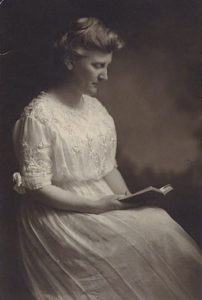
Mary W. Ovington
Mary White Ovington was born on this date in 1865. She was a white-American suffragette, socialist, journalist, and co-founder of the NAACP.
Her parents were from Brooklyn, New York, and they were members of the Unitarian Church and supported women's rights and the anti-slavery movement. She was educated at Packer Collegiate Institute and Radcliffe College and became involved in early civil rights in 1890 after hearing Frederick Douglass speak in a Brooklyn church. In 1895, Ovington helped found the Greenpoint Settlement in Brooklyn until 1904, when she was appointed a fellow of the Greenwich House Committee on Social Investigations. Over the next five years, she studied employment and housing problems in Black Manhattan.
During Ovington’s investigations, she met W. E. B. Du Bois when he was at Harvard University, and she was introduced to the founding members of the Niagara Movement. Ovington also joined the Socialist Party in 1905, where she met people such as Daniel De Leon, Asa Philip Randolph, Floyd Dell, Max Eastman, and Jack London, who argued that racial problems were as much a matter of class as race. She wrote for radical journals and newspapers such as The Masses, New York Evening Post, and The Call. She also worked with Ray Stannard Baker and influenced the content of his book Following the Color Line (1908).
On September 3, 1908, she read an article by socialist William English Walling entitled "Race War in the North" in The Independent. Walling described a massive race riot directed at Black residents in the hometown of Abraham Lincoln, Springfield, Illinois, that led to seven deaths, 40 homes and 24 businesses destroyed, and 107 indictments against rioters. Walling ended the article by calling for a powerful body of citizens to come to aid blacks. Ovington responded to the article by writing Walling and meeting at his apartment in New York City with social worker Dr. Henry Moskowitz. The group launched a campaign by issuing a "call" for a national conference on Blacks' civil and political rights on the centennial of Lincoln’s birthday, February 12, 1909.
Many responded to the “call” that eventually led to the formation of the National Negro Committee, which held its first meeting in New York on May 31 and June 1, 1909. By May 1910, the National Negro Committee and attendants, at its second conference, organized a permanent body known as the National Association for the Advancement of Colored People (NAACP), where Ovington was appointed as its executive secretary.
Early members included Josephine Ruffin, Mary Talbert, Mary Church Terrell, Inez Milholland, Jane Addams, George Henry White, William Du Bois, Charles Edward Russell, John Dewey, Charles Darrow, Lincoln Steffens, Ray Stannard Baker, Fanny Garrison Villard, Oswald Garrison Villard, and Ida Wells-Barnett.
The following year, she attended the Universal Races Congress in London. Ovington remained active in the struggle for women's suffrage and, as a pacifist, opposed America's involvement in the First World War. During the war, Ovington supported Asa Philip Randolph and his magazine, The Messenger, which campaigned for Black civil rights. After the war, Ovington served as the NAACP chairman. They fought a long legal battle against segregation and racial discrimination in housing, education, employment, voting, and transportation. They appealed to the Supreme Court to rule that several southern states passed unconstitutional laws and won three critical judgments between 1915 and 1923 concerning voting rights and housing.
Ovington wrote several books and articles, including a study of Black Manhattan, Half a Man (1911), Status of the Negro in the United States (1913), Socialism and the Feminist Movement (1914), an anthology for Black children, The Upward Path (1919), biographical sketches of prominent African Americans, Portraits in Color (1927), an autobiography, Reminiscences (1932) and a history of the NAACP, The Walls Come Tumbling Down (1947). Ovington retired as a board member of the National Association for the Advancement of Colored People in 1947 and, in doing so, ended decades of service with the organization. She died on July 15, 1951.